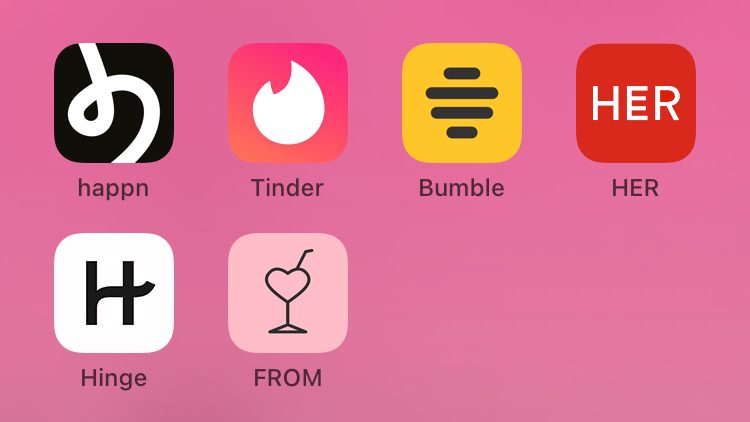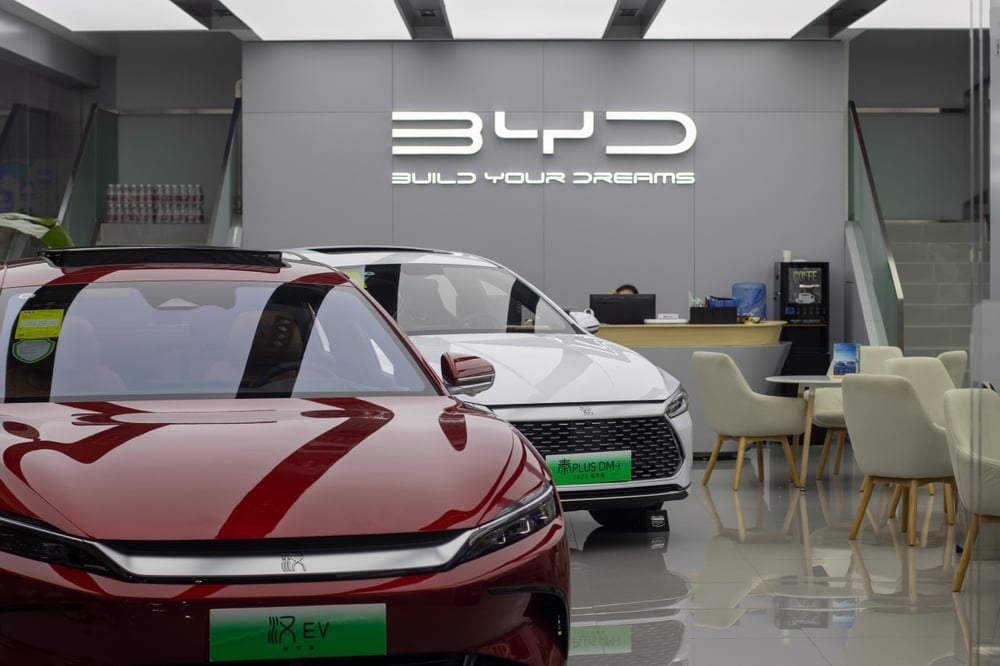The world of dating apps is not doing so hot right now, at least for the big name brands we’ve learned to love (or hate).
The biggest players in town, Match Group — the parent company of several dating apps, including Tinder and Bumble — are experiencing a bit of a slump after business boomed during the pandemic.
Now, industry leaders are struggling to keep both users and investors happy. And that’s not the worst thing for smaller, niche dating app startups looking to grow in a difficult industry.
For HER, the sapphic dating and community app, things have been going pretty well. The small startup has recently experienced a surge in users following an explosive summer for LGTBQ+ visibility — thanks in part to Chappell Roan and Reneé Rapp.
“It’s a really exciting time for sapphics as well as for the business … I think we now have this, like, awareness and recognition of sapphic identity, sapphic culture, and it’s kind of a really, like, a great, exciting time for our community,” Robyn Exton, the CEO and founder of HER told Marketplace.
Marketplace’s Nancy Marshall-Genzer caught up with Exton to learn more about the wild world of online dating. The following is an edited transcript of their conversation.
Nancy Marshall-Genzer: Why did you launch HER? And I guess it was, what about 10 years ago now?
Robyn Exton: Yeah, it’s nearly 10 years ago now. And it’s funny to think back to how different things were back then, because I think we take for granted so much the kind of prevalence and role that dating apps now have in all of our lives. But back then, there were very few dating apps. When I very first started, I think Tinder had just started, but many of the other big brands that we know now didn’t exist yet. And at the time, I really cared about this, because there were so many platforms that you could use — at least web-based platforms — that were designed for straight people. I think at the time, there was, you know, like hundreds for straight people. There were probably like 50 that were designed for gay men, and there wasn’t a single one that had been designed for queer women. And the few things that existed out there at the time were platforms that had been created for gay men, but they had been turned pink, and they said, “Great, this will work fine for lesbians,” and it was a terrible experience. It was, you know, bad design, bad user experience, and it was crazy to me. And so in my 27-year-old brain, I was like, “I can fix this. How hard can it be?” And so began a kind of 10-year journey of building HER.
Marshall-Genzer: And how hard was it?
Exton: I mean, it’s been many ups and downs along the path. It’s funny, sometimes I look back and I think even the belief that we had at the beginning, which is that if you design a platform that really looks at and focuses on the experiences that queer women are looking for, you can build something truly special and unique that none of the other people are able to actually cater to. Like now, it’s so valuable because, you know, many of the mainstream hetero platforms have options where you can select different sexualities and preferences, but those platforms will never be able to speak to what is so important about queer spaces, which is to focus on and celebrate the unique parts of sapphic culture and sapphic identity. And that’s what we get to do at HER, and that belief has been consistent all the way through. Many struggles like business-wise along the way, but we’ve definitely grown every year. It’s now a huge platform that has 15 million users in 114 countries and so kind of continues getting bigger and bigger every year.
Marshall-Genzer: I can see that. That’s tremendous growth, but as you say, you know, can be a struggle. Now, even some big name dating apps like Tinder and Bumble have been struggling with the post-pandemic economy. Are you dealing with that at HER?
Exton: We are not, which is, you know, great for us and great for business. I think a lot of the narrative around the post-pandemic market is because COVID, unsurprisingly, was a time when so many people moved to online dating. There were literally no other choices, and so a lot of people started using platforms — people who may have previously thought, “Ah, it’s not really for me,’ but during COVID they kind of had to. So I think some of the declines that have been seen, at least across the market, have been a bit of a normalization back. Like, usage is still higher than before COVID, but I think there’s also been a shift. Because these larger platforms — as they hit so much large scale — they kind of lose a bit of like connection and purpose to people. And dating is such an intimate, vulnerable and personal experience. And I think it’s why we’re seeing — like we had huge growth from Q1 to Q2, and I think we’re seeing this move of people off of these larger ones and into the more kind of identity and niche-driven platforms, because they’re looking for something with a bit more purpose to it and a bit more sense of authenticity and like “Why I am in this space and why [do] I want to meet these other people?”
Marshall-Genzer: So some dating app fatigue might be setting in, but it sounds like that’s not a problem for you. I have some research here that one in five Gen Z adults identifies as LGBTQ+ , so I suppose that’s very helpful for you.
Exton: Yeah, I actually think it’s a lot more. There was one piece of research that was, I think it was a couple of years ago, they found that fewer than 50% of Gen Zers identify as straight. It’s not saying that they are clearly assigning a label to themselves, but they’re like, “I just know that I’m not straight. I am open to fluidity. I am open to exploration.” And that’s a huge shift in the way people see their sexuality and gender. So absolutely for us at HER, for younger demographics, for Gen Z, there is a huge growing market, which is obviously incredibly exciting for us. And we really want to be that safe space, where people can explore their identity and know that they own a very like judgment-free, queer, celebratory space to build new connections.
Marshall-Genzer: You are still a business, though. I mean, you do have to make money, and from what I’m seeing, many people just aren’t willing to pay for a subscription to a dating app right now. How are we hoping to continue growing, considering that, especially since some users have complained that HER is a little glitchy and others don’t like certain features that are under a paywall?
Exton: Yeah we definitely, you know, we have a premium subscription. I don’t think everyone should pay for it. You know, that is like most dating apps, they’re a very well-established business model; it’s one that works very well. You know, dating apps are often at least 50% of the top 10 largest revenue products in the app store. So it’s a business model that works, and across most of those products, fewer than 10% are paying for subscriptions. And that’s OK. Like, if you don’t want to pay for the premium features, you don’t have to. And across most of these products, you can do whatever you need to for free, you can still get a date for free. The people who do want to invest in a premium subscription often have higher intentionality. They’re clear about what they’re looking for, and they want to have the control to be able to get to that outcome faster.
I think on HER like we’re a much smaller team than a lot of the other people in our industry and in our space. HER is a team of about 28 people, and we’re competing against the likes of Bumble, which is about 1,000 people, and the Match Group, which is probably 2,500 people. So there’s definitely whatever the kind of women version of David and Goliath would be scenarios playing out. But I think it also goes to show how much people value the experience that we give them in this sapphic space, because it’s not perfect. We do have to deal with like bugs and glitches and fixing them as soon as we can and get it out there, but we do it as a team with so much care and so much heart that people value it, that they stick with us as we continue to kind of improve the service and grow.
Marshall-Genzer: A big source of revenue from dating apps traditionally has come from men. How have you been able to navigate the market without catering to straight men?
Exton: Yeah. I think, you know, effectively monetizing LGBTQ+ women, nonbinary, trans people, is relatively uncharted territory in space. And honestly, I think it’s partially a privilege. Like, we get to actually study and explore: What do our users find valuable, and what do they want to pay for? Like, what is going to make that experience better? And that’s stuff that these larger platforms, they’re not even going to bother looking at it, because they’re going to focus on the people who are building money for them, and they’re going to continue to build features and services that cater to cis men, because that’s who is funding the platforms. And they always have to keep that part of the user base happy.
Marshall-Genzer: Yeah. But how do you keep your, especially your trans and non binary users, safe if you do have transphobia, even within the HER community?
Exton: Yeah, absolutely. That’s like a worldwide issue, and it’s something that we take so seriously. We have so many layers of safety that, you know, ranges from technology that is implemented and built that’s from different machine-learning models to different AI tools. We have layers that include human review teams, so any content that is flagged, either by our systems or by users inside the app, is then reviewed by humans. We have LGBTQ+ staff, and so they understand the nuances of queer culture and are able to like understand each specific report issue and what’s happening. We have moderators who are inside of the app and inside of the community and looking at both our community space and the content that is reported. And then on a kind of like macro level, we invest a lot on the platform in education, because I think a lot of people assume that if you identify as LGBTQ+, it’s completely like, everyone is fully aware of all the different nuances of different identities and that’s completely not the case. There is still so much work that has to be done within the community to educate each other about what these different identities and experiences mean for different users.
There’s a lot happening in the world. Through it all, Marketplace is here for you.
You rely on Marketplace to break down the world’s events and tell you how it affects you in a fact-based, approachable way. We rely on your financial support to keep making that possible.
Your donation today powers the independent journalism that you rely on. For just $5/month, you can help sustain Marketplace so we can keep reporting on the things that matter to you.


